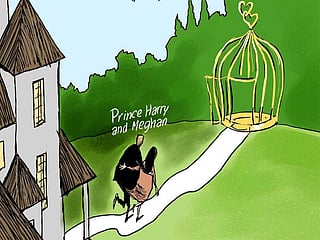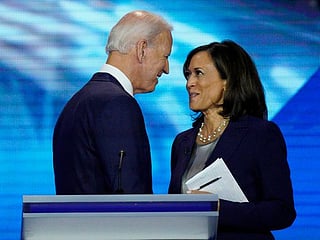Grappling with Hariri verdict fallout in Lebanon
Any new cabinet formation could now be linked to Beirut blast and Hariri verdict outcome

Also In This Package
The Special Tribunal for Lebanon (STL) has announced its verdict, naming one person, affiliated with Hezbollah, in the 2005 assassination of former Prime Minister Rafik Al Hariri. Apart from his name and photo, we know almost nothing about him. The rest of the accused, all standing trial in absentia, have been acquitted.
The Tribunal said that no evidence exists of Hezbollah top command’s involvement or that of Syria. Earlier accusations had pointed directly to senior Syrian officials, who many believed had acted in direct coordination with Hezbollah.
All of these figures, whether Ghazi Kanaan of Syria or Imad Maghnieh of Lebanon have all since died. Hezbollah chief Hassan Nasrallah says he will not extradite anyone, “not in 300 years,” saying that the STL is politicised by the international community, tailor-made to frame his party.
A prime minister who is not backed by Hezbollah might go as far as to call for a new investigation. This makes the cabinet formation in Lebanon directly linked both to the Beirut explosion and to the mild Hariri verdict, meaning that a pro-Western figure as Prime Minister of Lebanon seems unlikely at the momentSami Moubayed
The timing of the verdicts could not have come at a more critical time for Lebanon, just two weeks after a terrible explosion ripped through Beirut, killing at least 163 people and destroying the entire city.
The parliamentary bloc of Maronite leader Samir Gagegea is currently gathering signatures demanding an international investigation into the Beirut explosion, similar to the one created for the Hariri murder eleven years ago.
When Lebanon demanded an international probe, the pro-Western premier Fouad Al Siniora was in power. He gave the probe official legitimacy — something that Hezbollah is trying to avoid now.
That explains why they moved heaven and earth to maintain Hassan Diab at the premiership, fearing that he would be replaced by a pro-Western politician who would make an official request to the UN on behalf of the Lebanese government, demanding an international probe into the Beirut blast that would go hand-in-hand with the STL verdicts.
Verdict - a disappointment to many
But those verdicts were expected to be far more harsh and condemning of Hezbollah and have been a disappointment to most people. Diab was brought to power last January through the backing of Hezbollah and the Free Patriotic Movement (FPM) of President Michel Aoun.
He is vulnerable, totally dependent on Hezbollah for his political survival, meaning that he would never sign off on such a request without their approval. But Diab was forced to step down last week and is now in a caretaker capacity, with the high possibility that he may be soon replaced by someone like Saad Al Hariri.
Hezbollah’s ally, President Aoun, is yet to set a date for parliamentary consultations to decide on a new premier. While most MPs have already endorsed Hariri for the job, Hezbollah remains hauntingly silent, waiting to see how he will react to the STL verdicts.
They are not in a hurry to replace Diab and claim that he can carry out in a caretaker capacity for months. Constitutionally there is no deadline. So far, speaking from The Hague, Hariri has called on his supporters to show maximum self-restraint in light of today’s verdicts, avoiding any confrontation with Hezbollah.
The ex-Premier has made several conditions for a political comeback, like leading a technocrat government where ministers are chosen for their professionalism rather than their political affiliation. Hezbollah approval is a must, however, given that in addition to their military might, they and their allies control 57 out of 128-seats in the Chamber of Deputies.
Hariri and his allies command a minority of 48 seats only. If he accepts the verdicts and blames the party for his father’s murder, they will simply refuse to work with him and call on their allies to boycott Hariri. If he opts for a political comeback, he will need to work with Hezbollah — very unwillingly — to make it happen.
The party is bracing itself for the upcoming period, fearing that it might lead to international intervention in Lebanon, given that the STL is under Chapter 7 of the UN Charter.
Meaning the Lebanese government is obliged to cooperate fully with its findings and the UN can resort to force, if needed, to make sure that the accused person is brought to justice.
If Lebanese officialdom refuses to cooperate, the UN can send a special force to make that happen. This would be extremely difficult, however, putting international troops in a direct confrontation with Hezbollah — something that no country can commit to. But it seems unlikely.
For now, Hezbollah has no doubt that Hassan Diab will refuse to cooperate with the STL, just like he refuses to call for an international probe into the Beirut blast. What if he is replaced by somebody over whom they have no control?
The first nominee for the premiership was Nawaf Salam, a former ambassador to the UN and professor at the American University of Beirut. He is perceived as too-West by Hezbollah. They cannot trust him with the current investigations underway into the Beirut explosion, explaining the immediate double veto.
A prime minister who is not backed by Hezbollah might go as far as to call for a new investigation. This makes the cabinet formation in Lebanon directly linked both to the Beirut explosion and to the mild Hariri verdict, meaning that a pro-Western figure as Prime Minister of Lebanon seems unlikely at the moment.
— Sami Moubayed is a Syrian historian and former Carnegie scholar. He is also author of Under the Black Flag: At the frontier of the New Jihad.









